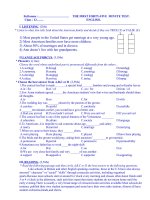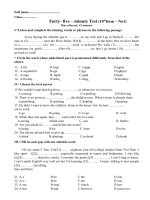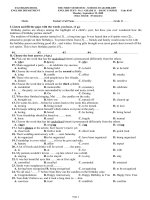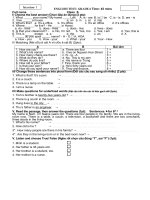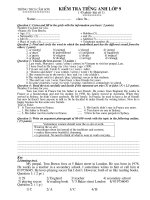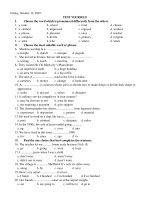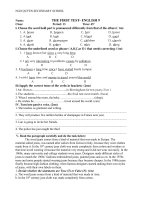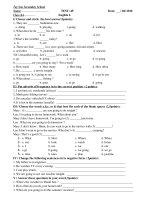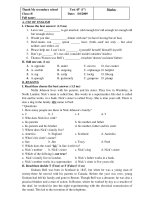Bai kiem tra so 1 Tieng Anh 10Sat chuong trinh hoc
Bạn đang xem bản rút gọn của tài liệu. Xem và tải ngay bản đầy đủ của tài liệu tại đây (94.24 KB, 9 trang )
<span class='text_page_counter'>(1)</span><div class='page_container' data-page=1>
<b>Bac Son High School</b>
<b>ENGLISH TEST 1</b>
Time allowance: 45’
Full name:……….
Class:…………
Code: 001
<b>I. Choose the word that has the underlined (letters) pronounced differently from the others.</b>
<b>( 1 point)</b>
1. A.hard B. subject C. worry D. lunch
2. A. language B. sand C. mathematics D. marvelous
3. A. chance B. teaching C. chemistry D. children
4. A. great B. teacher C. street D. receive
<b>II. Choose the one word or phrase - a, b, c or d - that best completes the sentence or </b>
<b>substitutes for the underlined word or phrase. (2,5 points)</b>
5. Marie Curie was born...November 7th<sub>, 1867.</sub>
A. in. B. from C. at D. on
6. Computer models help to determine whether a particular area is likely to flood.
A. make up B. find out C. take over D. put up
7.The man looked familiar. I ... him somewhere before.
A. saw B. have seen C. had seen D. see
8. Marie Curie...a Nobel Prize in Chemistry in 1911.
A. awarded B. was awarded C. had awarded D. had been awarded
9. I remember...you about this before.
A. tell B. to tell C. telling D. told
10. Just keep on...what you like.
A. do B. did C. doing D. done
11 . John isn't contented with his present salary.
A. excited about B. satisfied with C. disappointed about D. interested in
12. English is an international ...
A. language B. means C. subject D. profession
13. He agreed...the job as soon as possible.
A. start B. starting C. to start D. to be started.
14.. ... did the. Second World War end? ~ in 1945.
A. Where B. When C. What time <b> D. How long.</b>
<b>III. Writing: Make questions for the following responses ( 1 point)</b>
15. In a small village ->………?
16. In 1995 ->………...?
<b>IV. Identify the one underlined word or phrase - A, B. C or D - that must be changed for the </b>
<b>sentence to be correct. ( 1 point)</b>
</div>
<span class='text_page_counter'>(2)</span><div class='page_container' data-page=2>
The great English scientist Isaac Newton. whose theory of gravitation is well-known
throughout the world, was born in the little village Wool Thorpe, not far from his own town of
Cambridge, on December 25th, 1642. His father was a farmer who died when Newton was
fourteen years old. His mother. uncle and grandmother took care of him.
When still young. Newton was more of a mechanic than a scholar: His neighbors thought he
would probably become a well-known clockmaker, because he had already made a clock his
neighbours had never heard of before. It worked by water. Besides the water clock Newton also
made a sundial. When he grew older, he became interested in mathematics and physics. His first
physical experiment was carried out in 1658, when he was 16 years old.. On Jane 5th, 1661
Newton entered the University of Cambridge where he studied mathematics and soon became
famous at the age of 21.
When Newton was 22 years old, he began studying the theory of gravitation. In 1669 he was
appointed professor and began giving lectures on mathemat<sub>ics at Cambridge. Isaac Newton died in</sub>
1727 at the ace of 85.
<b>A. Decide whether the statements are true(T) or false(F) (1 point)</b>
21. Newton was not a physics, he was a mathematician.
22. He was interested in mathematics when he grew older.
23. His first physical experiment was carried out when he was not yet twenty.
24. He entered the University of Cambridge at the age of 21.
<b>B. Answer the questions (1,5 points)</b>
25. When was Newton born?
...
26. Was his father a worker?
...
27. What did he study in the University of Cambridge ?
………
<b>VI. LISTENING: Listen and fill the words you hear in the blanks ( 2 points)</b>
MY DAILY ROUTINE
My life is (28)………… full of activities, so I never have much (29)………… for myself.
During the week it's the worst. I usually have to (30)………… at half past six even though I
would really prefer to sleep much later. I don’t usually have time for (31)………… because
I have to catch a bus to school at (32)………… o'clock. The bus is usually packed with (33)
………… people. Classes at school start at a quarter to eight except on (34)…………
when they start at seven. Each lesson is forty-five minutes (35)………… with ten minutes
break in between.
<b>Answers:</b>
28……… 29………
30……… 31………
32……… 33………
</div>
<span class='text_page_counter'>(3)</span><div class='page_container' data-page=3>
<b>Bac Son High School</b>
<b>ENGLISH TEST</b>
Time allowance: 45’
Full name:……….
Class:…………
Code: 002
<b>I. Identify the one underlined word or phrase - A, B. C or D - that must be changed for the </b>
<b>sentence to be correct. ( 1 point)</b>
1. I decided changing jobs because my boss makes me work overtime.
A B C D
2. Why you call me so late last night?
A B C D
3. He always worries for crowded traffic when he goes to work.
A B C D
4. There is so many traffic in big cities.
A B C D
<b>II. Choose the one word or phrase - a, b, c or d - that best completes the sentence or </b>
<b>substitutes for the underlined word or phrase. (2,5 points)</b>
7. The man looked familiar. I ... him somewhere before.
A. have seen B. had seen C. see D. saw
8. Marie Curie...a Nobel Prize in Chemistry in 1911.
A. awarded B. was awarded C. had been awarded D. had awarded
9. Just keep on...what you like.
A. do B. did C. doing D. done
10 . John isn't contented with his present salary.
A. satisfied with B. excited about C. disappointed about D. interested in
11 English is an international ...
A. means B. language C. subject D. profession
12. He agreed...the job as soon as possible.
A. start B. starting C. to start D. to be started.
13. I remember...you about this before.
A. tell B. to tell C. telling D. told
14.. ... did the. Second World War end? ~ in 1945.
A. Where B. What time <b> C. How long. D. When</b>
15. Marie Curie was born...November 7th<sub>, 1867.</sub>
A. from B. in. C. on D. at
16. Computer models help to determine whether a particular area is likely to flood.
A. make up B. find out C. take over D. put up
</div>
<span class='text_page_counter'>(4)</span><div class='page_container' data-page=4>
The great English scientist Isaac Newton. whose theory of gravitation is well-known
throughout the world, was born in the little village Wool Thorpe, not far from his own town of
Cambridge, on December 25th, 1642. His father was a farmer who died when Newton was
fourteen years old. His mother. uncle and grandmother took care of him.
When still young. Newton was more of a mechanic than a scholar: His neighbors thought he
would probably become a well-known clockmaker, because he had already made a clock his
neighbours had never heard of before. It worked by water. Besides the water clock Newton also
made a sundial. When he grew older, he became interested in mathematics and physics. His first
physical experiment was carried out in 1658, when he was 16 years old.. On Jane 5th, 1661
Newton entered the University of Cambridge where he studied mathematics and soon became
famous at the age of 21.
When Newton was 22 years old, he began studying the theory of gravitation. In 1669 he was
appointed professor and began giving lectures on mathemat<sub>ics at Cambridge. Isaac Newton died in</sub>
1727 at the ace of 85.
<b>A. Decide whether the statements are true(T) or false(F) (1 point)</b>
21. Newton was not a physics, he was a mathematician.
22. He was interested in mathematics when he grew older.
23. His first physical experiment was carried out when he was not yet twenty.
24. He entered the University of Cambridge at the age of 21.
<b>B. Answer the questions (1,5 points)</b>
25. When was Newton born?
...
26. Was his father a worker?
...
27. What did he study in the University of Cambridge ?
………
<b>VI. LISTENING: Listen and fill the words you hear in the blanks ( 2 points)</b>
MY DAILY ROUTINE
My life is (28)………… full of activities, so I never have much (29)………… for myself.
During the week it's the worst. I usually have to (30)………… at half past six even though I
would really prefer to sleep much later. I don’t usually have time for (31)………… because
I have to catch a bus to school at (32)………… o'clock. The bus is usually packed with (33)
………… people. Classes at school start at a quarter to eight except on (34)…………
when they start at seven. Each lesson is forty-five minutes (35)………… with ten minutes
break in between.
<b>Answers:</b>
28……… 29………
30……… 31………
32……… 33………
</div>
<span class='text_page_counter'>(5)</span><div class='page_container' data-page=5>
<b>Bac Son High School</b>
<b>ENGLISH TEST</b>
Time allowance: 45’
Full name:……….
Class:…………
Code: 003
<b>I. READING: Read the passage and do the following tasks</b>
<b>ISAAC NEWTON</b>
The great English scientist Isaac Newton. whose theory of gravitation is well-known
throughout the world, was born in the little village Wool Thorpe, not far from his own town of
Cambridge, on December 25th, 1642. His father was a farmer who died when Newton was
fourteen years old. His mother. uncle and grandmother took care of him.
When still young. Newton was more of a mechanic than a scholar: His neighbors thought he
would probably become a well-known clockmaker, because he had already made a clock his
neighbours had never heard of before. It worked by water. Besides the water clock Newton also
made a sundial. When he grew older, he became interested in mathematics and physics. His first
physical experiment was carried out in 1658, when he was 16 years old.. On Jane 5th, 1661
Newton entered the University of Cambridge where he studied mathematics and soon became
famous at the age of 21.
When Newton was 22 years old, he began studying the theory of gravitation. In 1669 he was
appointed professor and began giving lectures on mathemat<sub>ics at Cambridge. Isaac Newton died in</sub>
1727 at the ace of 85.
<b>A. Decide whether the statements are true(T) or false(F) (1 point)</b>
1. Newton was not a physics, he was a mathematician.
2. He was interested in mathematics when he grew older.
3. His first physical experiment was carried out when he was not yet twenty.
4. He entered the University of Cambridge at the age of 21.
<b>B. Answer the questions (1,5 points)</b>
5. When was Newton born?
...
6. Was his father a worker?
...
7. What did he study in the University of Cambridge ?
………
<b>II. WRITING: Make questions for the following responses ( 1 point)</b>
8. At 6.30 a.m ->………..?
9.There are three pictures in her room.->………..?
<b>III. Identify the one underlined word or phrase - A, B. C or D - that must be changed for the</b>
<b>sentence to be correct. ( 1 point)</b>
</div>
<span class='text_page_counter'>(6)</span><div class='page_container' data-page=6>
15.The man looked familiar. I ... him somewhere before.
A. have seen B. had seen C. see D. saw
16. Marie Curie...a Nobel Prize in Chemistry in 1911.
A. awarded B. had been awarded C. was awarded D. had awarded
17.. ... did the. Second World War end? ~ in 1945.
A. Where B. What time <b> C. How long. D. When</b>
18 . John isn't contented with his present salary.
A. satisfied with B. excited about C. disappointed about D. interested in
19. I remember...you about this before.
A. tell B. telling C. to tell D. told
20. Marie Curie was born...November 7th<sub>, 1867.</sub>
A. on B. from C. in D. at
21. Computer models help to determine whether a particular area is likely to flood.
A. make up B. take over C. find out D. put up
22. He agreed...the job as soon as possible.
A. start B. to start C. starting D. to be started.
23. Just keep on...what you like.
A. doing B. did C. do D. done
<b>V. Choose the word that has the underlined (letters) pronounced differently from the others.</b>
<b>( 1 point)</b>
24. A. teaching B. chemistry C. chance D. children
25. A. street B. receive C. teacher D. great
26. A. worry B. subject C.hard D. lunch
27. A. mathematics C. sand C. language D. marvelous
<b>VI. LISTENING: Listen and fill the words/phrases you hear in the blanks ( 2 points)</b>
MY DAILY ROUTINE
My life is (28)………… full of activities, so I never have much (29)………… for myself.
During the week it's the worst. I usually have to (30)………… at half past six even though I
would really prefer to sleep much later. I don’t usually have time for (31)………… because
I have to catch a bus to school at (32)………… o'clock. The bus is usually packed with (33)
………… people. Classes at school start at a quarter to eight except on (34)…………
when they start at seven. Each lesson is forty-five minutes (35)………… with ten minutes
break in between.
<b>Answers:</b>
28……… 29………
30……… 31………
32……… 33………
</div>
<span class='text_page_counter'>(7)</span><div class='page_container' data-page=7>
<b>Bac Son High School</b>
<b>ENGLISH TEST</b>
Time allowance: 45’
Full name:……….
Class:…………
Code: 004
<b>I. WRITING: Make questions for the following responses ( 1 point)</b>
1.$ 15 ->………..?
2.On Thursday. ->………..?
<b>II. READING: Read the passage and do the following tasks</b>
<b>ISAAC NEWTON</b>
The great English scientist Isaac Newton. whose theory of gravitation is well-known
throughout the world, was born in the little village Wool Thorpe, not far from his own town of
Cambridge, on December 25th, 1642. His father was a farmer who died when Newton was
fourteen years old. His mother. uncle and grandmother took care of him.
When still young. Newton was more of a mechanic than a scholar: His neighbors thought he
would probably become a well-known clockmaker, because he had already made a clock his
neighbours had never heard of before. It worked by water. Besides the water clock Newton also
made a sundial. When he grew older, he became interested in mathematics and physics. His first
physical experiment was carried out in 1658, when he was 16 years old.. On Jane 5th, 1661
Newton entered the University of Cambridge where he studied mathematics and soon became
famous at the age of 21.
When Newton was 22 years old, he began studying the theory of gravitation. In 1669 he was
appointed professor and began giving lectures on mathemat<sub>ics at Cambridge. Isaac Newton died in</sub>
1727 at the ace of 85.
<b>A. Decide whether the statements are true(T) or false(F) (1 point)</b>
3. Newton was not a physics, he was a mathematician.
4. He was interested in mathematics when he grew older.
5. His first physical experiment was carried out when he was not yet twenty.
6. He entered the University of Cambridge at the age of 21.
<b>B. Answer the questions (1,5 points)</b>
7. When was Newton born?
...
8. Was his father a worker?
...
9. What did he study in the University of Cambridge ?
………
<b>III. Identify the one underlined word or phrase - A, B. C or D - that must be changed for the</b>
<b>sentence to be correct. ( 1 point)</b>
</div>
<span class='text_page_counter'>(8)</span><div class='page_container' data-page=8>
15 . John isn't contended with his present salary.
A. excited about B. satisfied with C. disappointed about D. interested in
16. I remember...you about this before.
A. tell B. telling C. to tell D. told
17. English is an international ...
A means B. subject C. profession D. language
18.The man looked familiar. I ... him somewhere before.
A. have seen B. see C. had seen D. saw
19. He agreed...the job as soon as possible.
A. start B. starting C. to be started. D. to start
20. Just keep on...what you like.
A. did B. do C. doing D. done
21. Computer models help to determine whether a particular area is likely to flood.
A. find out B. make up C. take over D. put up
22. Marie Curie was born...November 7th<sub>, 1867.</sub>
A. from B. on C. in D. at
23.. ... did the. Second World War end? ~ in 1945.
A. Where B. What time <b> C. How long. D. When</b>
<b>V. Choose the word that has the underlined (letters) pronounced differently from the others.</b>
<b>( 1 point)</b>
24. A. subject B. worry C.hard D. lunch
25. A. chemistry B. chance C. children D. teaching
26. A. mathematics B. marvelous C. sand D. language
27. A. street B. great C. receive D. teacher
<b>VI. LISTENING: Listen and fill the words/phrases you hear in the blanks ( 2 points)</b>
MY DAILY ROUTINE
My life is (28)………… full of activities, so I never have much (29)………… for myself.
During the week it's the worst. I usually have to (30)………… at half past six even though I
would really prefer to sleep much later. I don’t usually have time for (31)………… because
I have to catch a bus to school at (32)………… o'clock. The bus is usually packed with (33)
………… people. Classes at school start at a quarter to eight except on (34)…………
when they start at seven. Each lesson is forty-five minutes (35)………… with ten minutes
break in between.
<b>Answers:</b>
28……… 29………
30……… 31………
32……… 33………
</div>
<span class='text_page_counter'>(9)</span><div class='page_container' data-page=9></div>
<!--links-->
